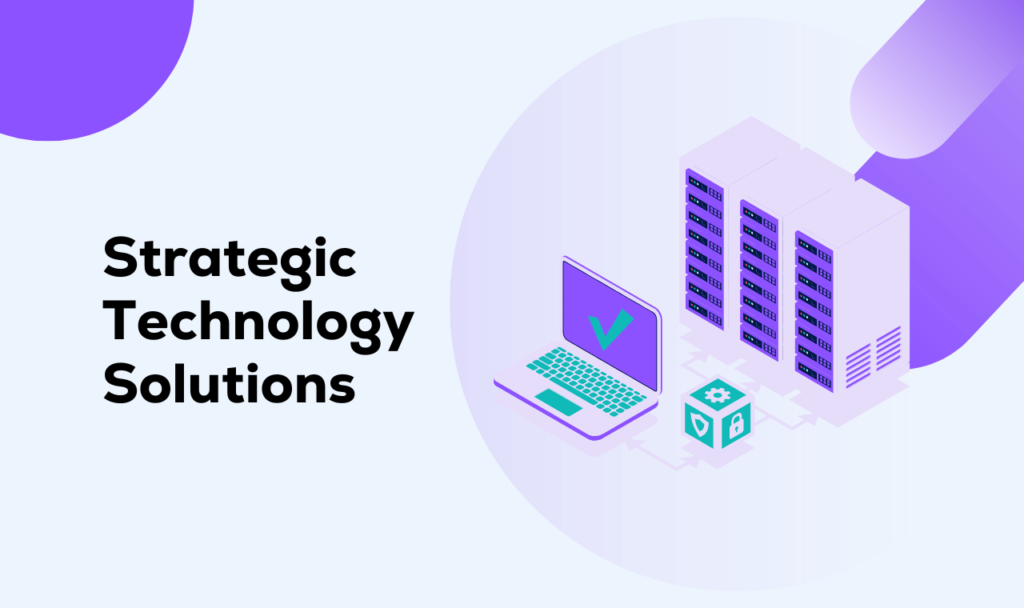Are you ready for a deep dive into how technology has become the driving force behind strategic success? In today’s fast-paced world, technology is no longer just a tool for convenience; it is a cornerstone of strategic planning, growth, and sustainability for businesses of all sizes. Whether we’re talking about startups or global enterprises, integrating strategic technology solutions into an organization’s framework can be the game-changer that determines whether a company thrives or struggles to keep up with its competitors.
In this article, we will explore the multifaceted role that technology plays in shaping a company’s strategy. From improving operational efficiency and enhancing customer experiences to enabling innovation and ensuring security, the strategic importance of technology cannot be overstated.
Technology is no longer an option—it’s a necessity for those looking to survive and succeed in the modern business landscape. Let’s unpack this concept by looking at the different ways technology is impacting business strategy and why leveraging the right solutions can set your company apart from the competition.
What is a strategic technology?
A strategic technology refers to technology that plays a critical role in achieving the long-term goals, competitive advantages, and operational success of an organization. It is not just about using any technology, but rather leveraging specific technologies that align with and enhance the overall business strategy. These technologies are carefully chosen to support a company’s mission, optimize its processes, foster innovation, and maintain its competitive position in the market.
Strategic technologies can vary depending on the industry and the company’s specific needs but generally include:
- Cloud Computing – Enables scalability, flexibility, and cost efficiency by allowing businesses to store data and run applications online rather than on physical servers.
- Artificial Intelligence (AI) and Machine Learning – Used to automate processes, analyze large sets of data, and provide insights that help in decision-making, customer personalization, and innovation.
- Data Analytics – Aids in collecting, processing, and analyzing data to make informed, data-driven decisions that align with business objectives.
- Cybersecurity Technologies — Protects sensitive data, ensures compliance with regulations, and safeguards against cyber threats, which is critical for maintaining trust and operational integrity.
- Internet of Things (IoT) — This technology connects physical devices to the Internet, allowing businesses to gather real-time data for operational improvements, predictive maintenance, and enhanced customer experiences.
- Blockchain – Enhances transparency and security, particularly in sectors like finance and supply chain management, where trust and traceability are vital.
Here are the 7 strategic points that are important for technology

1. Technology as the Backbone of Business Operations
When we talk about the strategic importance of technology, the first thing that comes to mind is its role in streamlining business operations. Strategic technology solutions enable organizations to automate repetitive tasks, reduce human error, and optimize workflows. Whether it’s a cloud-based enterprise resource planning (ERP) system, customer relationship management (CRM) software, or artificial intelligence (AI)-powered automation, these technologies allow businesses to function more efficiently and cost-effectively.
For instance, implementing ERP systems helps in integrating various business functions like inventory management, finance, and human resources into a single, unified system. This not only reduces operational bottlenecks but also provides managers with real-time insights into the company’s performance.
Moreover, AI-powered tools can predict market trends, enabling businesses to stay ahead of the competition by making informed decisions faster than ever before.
2. Enhancing Customer Experiences Through Technology
Another critical aspect of strategic technology solutions lies in their ability to enhance customer experiences. In today’s customer-centric market, companies must go beyond merely selling products or services. They must offer personalized, efficient, and convenient interactions at every touchpoint. This is where technologies like AI, machine learning, and data analytics come into play.
For example, AI-powered chatbots can provide customers with 24/7 support, answering frequently asked questions and troubleshooting issues in real time. This level of immediate, on-demand service can significantly improve customer satisfaction and loyalty. Additionally, data analytics allows businesses to gather and analyze customer data, helping them to tailor their offerings to meet individual preferences. By leveraging strategic technology solutions, companies can offer a more personalized experience that builds trust and fosters long-term relationships with their customers.
3. Technology Fuels Innovation and Competitiveness
Innovation is essential for survival in a competitive global market. Strategic technology solutions enable companies to innovate faster by providing tools that streamline research and development processes, enhance collaboration, and shorten product development cycles. Technologies such as 3D printing, AI, and the Internet of Things (IoT) are transforming industries by enabling businesses to create products and services that were previously unimaginable.
Take the automotive industry, for example. Electric vehicles (EVs) and autonomous driving technologies are revolutionizing the way we think about transportation. Companies that have embraced these innovations are leading the market, while those that have been slow to adopt are struggling to catch up. The lesson here is clear: adopting the right technology at the right time can give companies a significant competitive edge.
Moreover, technology fosters collaboration within and between organizations. Platforms like cloud-based project management software, video conferencing tools, and digital workspaces enable teams to work together, regardless of their geographical locations. This opens up new opportunities for businesses to access global talent, expand into new markets, and collaborate on innovative projects.
4. Data-Driven Decision Making
One of the most powerful impacts of technology on business strategy is its ability to facilitate data-driven decision-making. In the digital age, data is often referred to as the “new oil,” because of its potential to drive substantial value for companies. Strategic technology solutions such as data analytics platforms, machine learning algorithms, and business intelligence (BI) tools allow businesses to gather vast amounts of data and extract actionable insights.
These insights can inform decisions related to marketing strategies, product development, customer engagement, and more. By making data-driven decisions, businesses can mitigate risks, improve operational efficiency, and optimize performance in ways that were previously impossible.
Furthermore, predictive analytics can help organizations anticipate future trends, allowing them to be proactive rather than reactive in their decision-making processes.
5. Ensuring Security and Compliance
With the rise of digital transformation comes the need for enhanced cybersecurity measures. Businesses that rely heavily on technology are increasingly vulnerable to cyberattacks, data breaches, and other security threats. Therefore, integrating robust strategic technology solutions into an organization’s IT infrastructure is crucial for safeguarding sensitive data and ensuring regulatory compliance.
For example, industries like healthcare and finance deal with vast amounts of sensitive information, making data security a top priority. Regulatory requirements such as the General Data Protection Regulation (GDPR) in Europe and the Health Insurance Portability and Accountability Act (HIPAA) in the United States impose strict guidelines for data protection. Failing to comply with these regulations can result in hefty fines and irreparable damage to a company’s reputation.
To mitigate these risks, businesses must implement cybersecurity measures such as encryption, multi-factor authentication, and continuous network monitoring for suspicious activity.
Additionally, strategic technology solutions can help organizations stay compliant by automating the process of maintaining and reporting regulatory requirements.
6. Flexibility and Scalability
The strategic importance of technology also lies in its ability to offer flexibility and scalability. As businesses grow, they need systems that can scale alongside them without significant disruption to their operations. Cloud computing is a prime example of a strategic technology solution that offers both flexibility and scalability.
With cloud-based infrastructure, businesses can easily scale their IT resources up or down based on demand. This means that companies no longer have to invest heavily in physical servers or worry about overcapacity during peak periods. Cloud computing also enables remote work by providing employees with access to business applications and data from anywhere in the world. This flexibility is especially crucial in today’s post-pandemic world, where remote work has become the norm for many industries.
Moreover, cloud solutions offer cost-efficiency by allowing businesses to pay only for the resources they use, reducing overhead costs. Companies can also take advantage of the latest technologies without having to make significant upfront investments in hardware or software.
7. The Role of Technology in Sustainability
Sustainability has become a growing concern for businesses worldwide. As companies seek to reduce their carbon footprints and promote environmentally friendly practices, strategic technology solutions play a vital role in helping organizations meet their sustainability goals. Technologies such as IoT, AI, and blockchain are being used to monitor and optimize energy consumption, reduce waste, and track carbon emissions.
For example, smart building technologies use IoT sensors to monitor energy usage in real-time, adjusting heating, cooling, and lighting systems to minimize energy waste. In supply chain management, blockchain technology is being used to ensure transparency and traceability, allowing businesses to track the environmental impact of their products from production to delivery.
By adopting strategic technology solutions that promote sustainability, businesses can not only reduce their environmental impact but also appeal to eco-conscious consumers. This can lead to increased brand loyalty and a competitive advantage in a market that increasingly values sustainability.
Conclusion
In conclusion, the strategic importance of technology cannot be overstated in today’s business landscape. From improving operational efficiency and enhancing customer experiences to fueling innovation and ensuring security, strategic technology solutions play a critical role in shaping the success of modern organizations. By leveraging the right technologies, businesses can gain a competitive edge, make data-driven decisions, and scale their operations efficiently.
Moreover, technology is not just about solving problems; it’s about enabling new opportunities and driving sustainable growth. As the business environment continues to evolve, organizations that embrace technology’s strategic importance will be better positioned to thrive in the future.
Are you ready to harness the power of technology to elevate your business strategy? The time to act is now!
FAQs
What are technology solutions?
Technology solutions are tools, systems, or software designed to address specific business challenges, improve efficiency, and support organizational goals.
How do you create a strategic technology plan?
A strategic technology plan is created by assessing business objectives, identifying key technology needs, setting measurable goals, and implementing technologies that align with long-term goals.
What is the role of strategic technology management?
Strategic technology management focuses on selecting, implementing, and managing technologies that support an organization’s business strategy and help it maintain a competitive edge.
What is a good technology strategy?
A good technology strategy aligns with the organization’s goals, is adaptable to changing market conditions, and incorporates innovative solutions to improve efficiency and competitiveness.
What are the five strategic elements?
The five strategic elements include vision, mission, objectives, strategy, and tactics, all of which guide an organization’s long-term direction and success.



